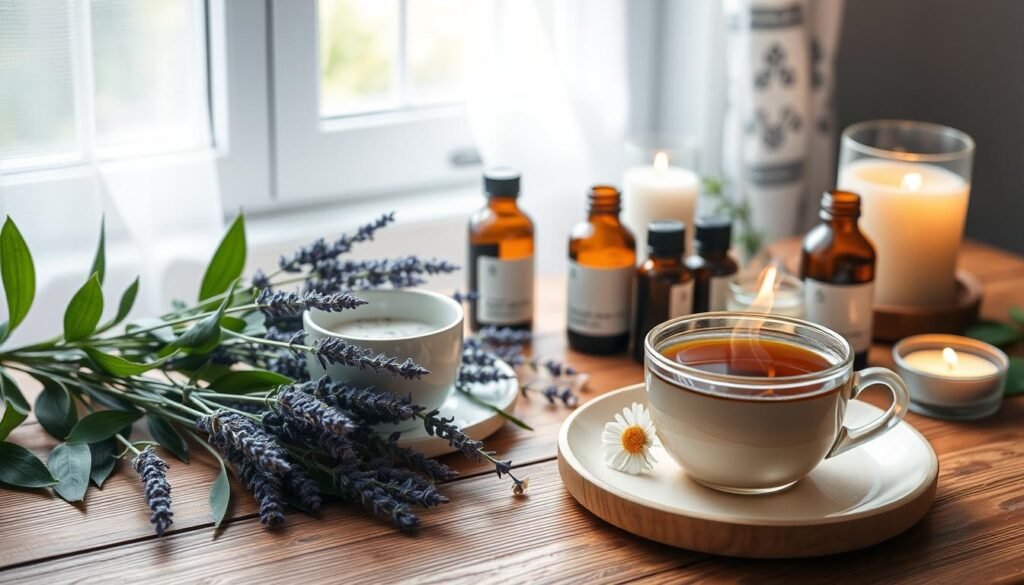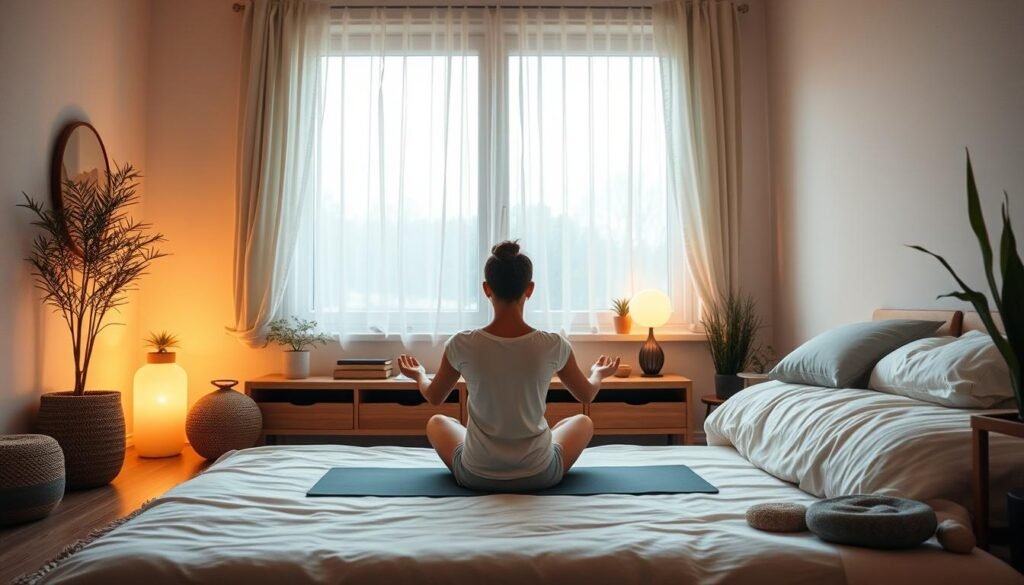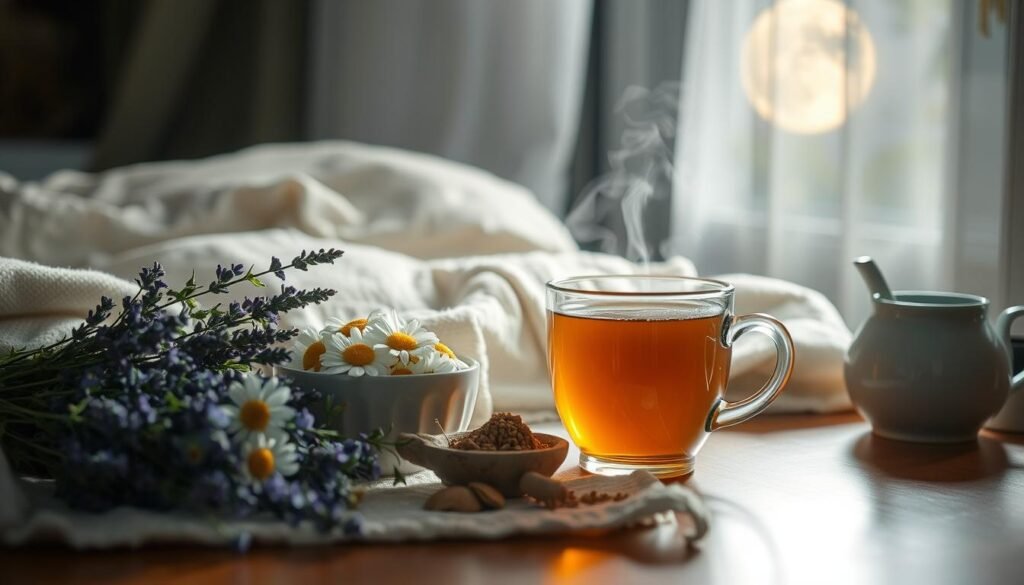Over 60 million Americans have trouble sleeping. This shows a huge need for effective, natural anxiety and insomnia solutions. Many are moving away from traditional drugs. They are looking for natural ways to improve their mental and physical health without side effects.
This article will introduce a range of safe, natural methods to lessen anxiety and get better sleep. We’ll talk about calming herbs, mindfulness, and good sleep habits. You’ll find real steps to help your well-being.
Key Takeaways
- Over 60 million Americans experience sleep issues.
- Holistic anxiety remedies provide alternatives to pharmaceuticals.
- Natural sleep aids include calming herbs and essential oils.
- Mindfulness practices can significantly relieve anxiety symptoms.
- Sleep hygiene improvements contribute to better rest quality.
- A healthy lifestyle, including exercise, can reduce anxiety symptoms.
Understanding Anxiety and Insomnia
Anxiety disorders and insomnia affect many people in the US. Over 19% of adults feel anxious, while 60 million Americans have trouble sleeping. These problems can make each other worse. This can lead to emotional distress, tiredness, and health problems. It shows how serious anxiety and insomnia can be for one’s life.
There are many ways to treat anxiety and insomnia. Medicines like benzodiazepines and antidepressants help many. Understanding these treatments is key to finding relief. Changes in lifestyle, therapy, and natural remedies also play a big part.
Recently, natural remedies have become more popular. Warm milk, chamomile tea, and tart cherry juice help with sleep. Exercise improves sleep by encouraging deeper sleep stages. Also, aerobic exercise releases endorphins which help with sleep.
Melatonin plays a big role in sleep. It starts working about four hours before we sleep to adjust our body clock. Small doses of melatonin, from 0.1 to 0.3 milligrams, often help. Yet, the use of herbs like valerian and kava needs more study.
To deal with anxiety and insomnia, we must understand them well. Exploring both traditional and natural treatments can help. This way, people can find peace and sleep better.
Causes and Effects of Anxiety
Anxiety disorders are a big issue, with over 19% of US adults affected yearly. Reasons for anxiety include genetics, environment, and stress. Anxiety varies from person to person, making it harder to deal with.
The effects of anxiety show up in several ways. You might worry a lot or feel nervous. Or, you may have a racing heart and sweat too much. These issues can mess up both work and personal life. If not treated, anxiety can make other health problems worse, hurting your overall happiness.
Research has found exercise helps with anxiety. Workouts, especially intense ones, can reduce anxiety symptoms. Making exercise a regular habit is key. Also, active stress management improves mental health.
Going to therapy, like cognitive behavioral therapy (CBT), can be useful. It helps you understand your anxiety triggers and learn how to cope. Using time management to tackle big tasks step by step can also reduce anxiety.
In the US, anxiety is the most common mental health problem. By knowing more about anxiety’s causes and effects, we can find better treatments. This improves life quality.
Impact of Insomnia on Health
A lot of people deal with insomnia, with rates between 8% and 40%. It’s more than just trouble sleeping; it seriously hurts our health. About 20% to 30% of folks report not sleeping well, and 8% to 10% have chronic insomnia. This often leads to further health problems.
Studies show insomnia can increase the risk of heart and brain issues. It raises stress levels, messing with our body’s stress response. High stress levels lead to poor sleep, making the problem worse. Short sleep can even lead to more sickness or death.
Those in middle age might get hit harder by insomnia, which is also common in older people. Besides the body, insomnia messes with our emotions and thinking. It makes it hard to focus and stay in a good mood. Many with insomnia feel bad for a long time, with some suffering over a year.
In the US, around 30% of adults have trouble sleeping, especially women and older folks. The side effects from sleep meds don’t help. People can feel groggy, slower, or have trouble thinking because of these meds. This shows the need for other ways to deal with sleep troubles.
Table 1 shows the bad stuff that comes with not sleeping well because of insomnia:
| Health Effect | Description |
|---|---|
| Cognitive Decline | Impaired focus, memory, and decision-making abilities. |
| Cardiometabolic Risks | Increased risk of heart disease and diabetes. |
| Mood Disorders | Elevated anxiety and depression levels. |
| Impaired Immune Function | Weakened immune response leading to increased illness. |
| Weight Gain | Increased cortisol levels can lead to obesity. |
Knowing how bad insomnia can be shows why we need to sleep well. Being aware lets us work on sleeping better for our health.
Natural Remedies for Anxiety and Insomnia
Many people seek solutions for anxiety and insomnia. They aim for a better mental and physical state. There are natural remedies for anxiety and insomnia like herbs, lifestyle changes, and being mindful. These approaches often help calm the mind and better sleep.
Overview of Natural Solutions
Natural remedies help manage anxiety and sleep problems. They’re favored for fewer side effects compared to medicine. Popular choices include:
- Chamomile: Taking a 200-milligram extract capsule daily improves sleep, mainly in older adults. It lowers anxiety in doses from 220 to 1100 milligrams.
- Lemon Balm: It’s helpful for insomnia and anxiety. Taking 300 milligrams daily for 15 days works, and more can aid stress from premenstrual disorder.
- Valerian Root: Doses of 400-900 milligrams before sleep enhance sleep quality.
- Lavender Oil: Its calming effect helps with sleep patterns and reduces anxiety.
Benefits of Using Natural Remedies
Studies show natural remedies are effective. Users report fewer side effects and better health. Benefits include:
- They’re easy to include in daily life without relying on drugs.
- Studies say natural methods like massage and mindfulness greatly improve sleep and lower anxiety.
- Exercising for at least 150 minutes a week can lessen insomnia and anxiety symptoms.

Calming Herbs for Anxiety and Sleep
Exploring calming herbs provides natural ways to fight anxiety and better sleep. Many herbal remedies are known to help with relaxation and anxiety. Using these herbs daily can relieve stress and improve well-being.
Top Herbal Options for Anxiety Relief
Top calming herbs for better sleep and less anxiety include:
- Chamomile: Known for its calming effects, it might reduce anxiety and better sleep. Some research supports its use in anxiety relief.
- Lavender: Famous for its soothing scent, lavender oil can lessen anxiety. Its terpenes work with brain receptors to ease anxiety short-term.
- Valerian Root: Often used for insomnia, it helps users relax and sleep, easing anxiety indirectly.
- Ashwagandha: As an adaptogen, it could lower stress levels, helping with anxiety.
- Passionflower: With calming effects, certain types may reduce anxiety-related restlessness and nervousness.
- Galphimia Glauca: Not very common, but promising for anxiety treatment. More research is needed.
Effective Herbal Tea Blends
Herbal tea blends at night can boost relaxation and sleep readiness. Here are some great blends:
| Herbal Tea Blend | Main Herbs | Benefits |
|---|---|---|
| Chamomile & Lavender | Chamomile, Lavender | Promotes relaxation and may improve sleep quality. |
| Valerian & Lemon Balm | Valerian Root, Lemon Balm | Helps reduce anxiety and enhance sleep. |
| Ashwagandha & Ginger | Ashwagandha, Ginger | Supports stress reduction and overall calmness. |
| Passionflower & Peppermint | Passionflower, Peppermint | Eases restlessness and enhances relaxation. |
For anyone seeking anxiety relief through herbs, these options are worth exploring. Always talk to a healthcare professional before starting herbal supplements. Some could affect your medications. For detailed info, check out herbal treatment resources.
Mindfulness Meditation Techniques
Mindfulness meditation helps reduce anxiety and improve sleep. Around 35% to 50% of adults suffer from insomnia worldwide. Those who practice it find they can handle anxiety and sleep issues better, thanks to techniques promoting mental clarity.
There are many techniques in mindfulness meditation to ease stress and help you unwind. Focused breathing is key. You focus on breathing, letting go of distractions. There’s also mantra repetition, which steadies the mind. It calms racing thoughts, aiding those new to meditation for sleep.
Research backs the sleep benefits of mindfulness meditation. A 2018 study of 18 trials showed it significantly boosts sleep quality, even months later. Guided meditation programs are proving successful, improving sleep for those who try them.

Yoga combines mindfulness, breathing, and stretching to lessen stress and better sleep. Yoga nidra, inducing a sleep-like state, reduces time awake in bed and enhances sleep. Yoga and mindfulness together offer a complete solution for insomnia.
Mindfulness can also mimic exercise or cognitive therapy effects, improving sleep stages. It slows your breathing, reduces your heart rate, and lowers stress hormone levels. This aids in anxiety relief. Adding these methods to your daily life brings more peace and relaxation.
Learning to practice mindfulness right ensures you get its full advantages. Along with healthy sleep habits, it helps you find the rest and peace you seek.
For more detailed techniques and exercises, visit the Mayo Clinic’s guide on mindfulness exercises.
The Role of Exercise in Managing Anxiety
Exercising regularly helps ease anxiety and boosts sleep quality. It improves mental health by releasing endorphins, lifting mood, and aiding relaxation. Certain exercises are especially good for fighting anxiety and insomnia.
Types of Beneficial Workouts
Different exercises can help manage anxiety effectively. Highlighted below are the most useful ones:
- Aerobic Activities: Running, cycling, and swimming increase heart rates. They help release serotonin and dopamine, important for feeling good.
- Yoga and Stretching: These focus on mindfulness and breathing deeply. They calm the mind and make relaxation easier.
- Resistance Training: Weight lifting reduces depression symptoms and improves confidence. It’s great for mental wellness.
- Interval Training: Intense exercise bursts followed by rest improve heart health. They also reduce stress and anxiety.
The U.S. Department of Health and Human Services suggests adults get at least 150 minutes of moderate activity weekly. Mixing different types of exercises helps address anxiety and sleep problems well.
When to Exercise for Best Results
Choosing the right time for exercise can make it more beneficial. Working out in the early morning or mid-afternoon is ideal. It energizes the start of the day or boosts energy in the afternoon. Exercising at a regular time helps make it a habit.
Start slowly and increase effort gradually if you’re new to exercise. Enjoying the activity, like working out with a friend, can motivate you. Remember, warming up, cooling down, and stretching improve results.
Even 20 minutes of moderate exercise can greatly reduce anxiety. Any physical activity is key in a well-rounded approach to managing anxiety and getting better sleep. Staying active regularly boosts mental health, as the Mayo Clinic confirms in discussing the connection between exercise and anxiety.
Natural Sleep Aids for Better Rest
Many people look for natural ways to improve their sleep. Melatonin is a popular choice. This hormone helps regulate our sleep patterns. It’s useful for those with insomnia or anxiety, and travelers with jet lag. It’s also good for those who have trouble falling asleep. You can take 0.5 mg to 5 mg of melatonin 30 minutes before bed. But remember, even natural aids have side effects. Always talk to a doctor before you start taking anything.
Melatonin Supplements: What to Know
Melatonin is safe for most when used correctly. You can buy it without a prescription. Yet, some may experience headaches, dizziness, and feel sleepy during the day. Research shows it might help older adults sleep better and feel more alert in the morning. But don’t drink alcohol with melatonin. It can make you too sleepy. If you have health issues, be extra careful with these supplements.
Exploring Essential Oils and Aromatherapy
Essential oils are another natural option for better sleep. Lavender oil, known for its calm vibes, can help you relax. Aromatherapy uses these oils to lower stress and help you sleep better. Oils like chamomile and bergamot also soothe and help you sleep. You can use them in diffusers or apply them on your skin with a carrier oil. Like any supplement, talk to your doctor if you plan to try them.

| Natural Sleep Aids | Benefits | Potential Side Effects |
|---|---|---|
| Melatonin | Regulates sleep cycles, helps mitigate jet lag | Headache, nausea, daytime drowsiness |
| Valerian | May improve sleep quality | Dizziness, gastrointestinal discomfort |
| Lavender Oil | Promotes relaxation and reduces anxiety | Allergic reactions (rare) |
| Magnesium | Improves sleep quality and duration | Stomach cramping, nausea |
Practical Sleep Hygiene Tips for Insomnia
Getting good sleep is key for those with insomnia. Changing your bedroom and daily habits can make a big difference. These sleep hygiene tips are crucial for a better night’s rest.
Bedroom Environment Adjustments
Making your bedroom perfect for sleep is important. Here are some important changes to make:
- Temperature Control: Keep your bedroom cool, between 65 to 68 degrees Fahrenheit, to sleep better.
- Light Management: Use blackout curtains to keep it dark and help you sleep without interruptions.
- Noiseless Surroundings: White noise machines or earplugs can block out sound, making your room quiet for sleep.
- Comfortable Bedding: A quality mattress and pillows are key for sleeping well. They should support and comfort you.
Routine Changes to Enhance Sleep Quality
Sticking to a regular routine helps with sleep. Try these steps:
- Maintain a Regular Sleep Schedule: Sleep and wake at the same time every day. It tunes your body’s clock.
- Limit Daytime Naps: Naps should be short and early. Long naps can mess up night sleep.
- Wind Down Before Bed: Do calming activities before bed. Avoid screens at least an hour before sleep.
- Avoid Heavy Meals and Alcohol: Eating a lot or drinking alcohol before bed disrupts sleep. Keep evening meals light.
- Incorporate Physical Activity: Exercise helps, but not too close to bedtime. It makes falling asleep easier.
Following these tips can improve your sleep and well-being. If sleep issues continue, seeking advice from a healthcare provider is a good idea.
Conclusion
Finding ways to beat anxiety and insomnia naturally is key for better health. In the U.S., 6.8 million people face generalized anxiety disorder. Around 55 million have mental health issues. This shows how important it is to find good solutions.
Natural remedies like kava and passionflower can truly make a difference. They’ve been backed by studies. They’re safer than many drugs, having fewer serious side effects. Adding mindfulness and exercise can make these treatments even more effective.
Using these natural methods can help people take charge of their mental health. There are many options to explore. Each person can find what works best for them, leading to peaceful sleep and a calm mind. This approach could mean a healthier, more balanced life.